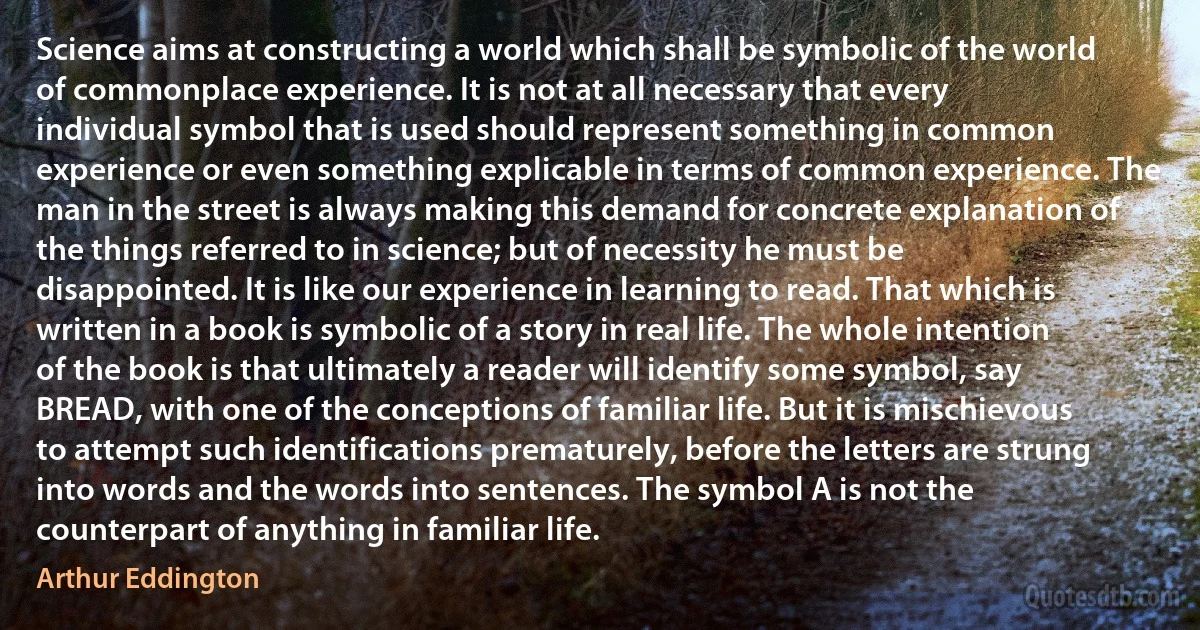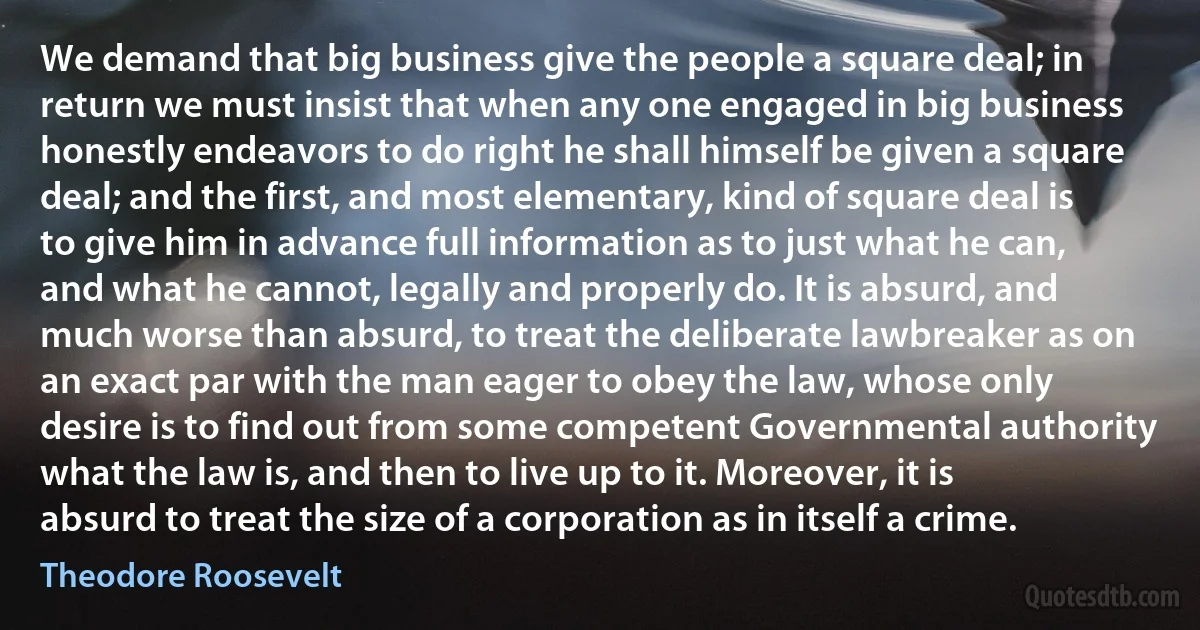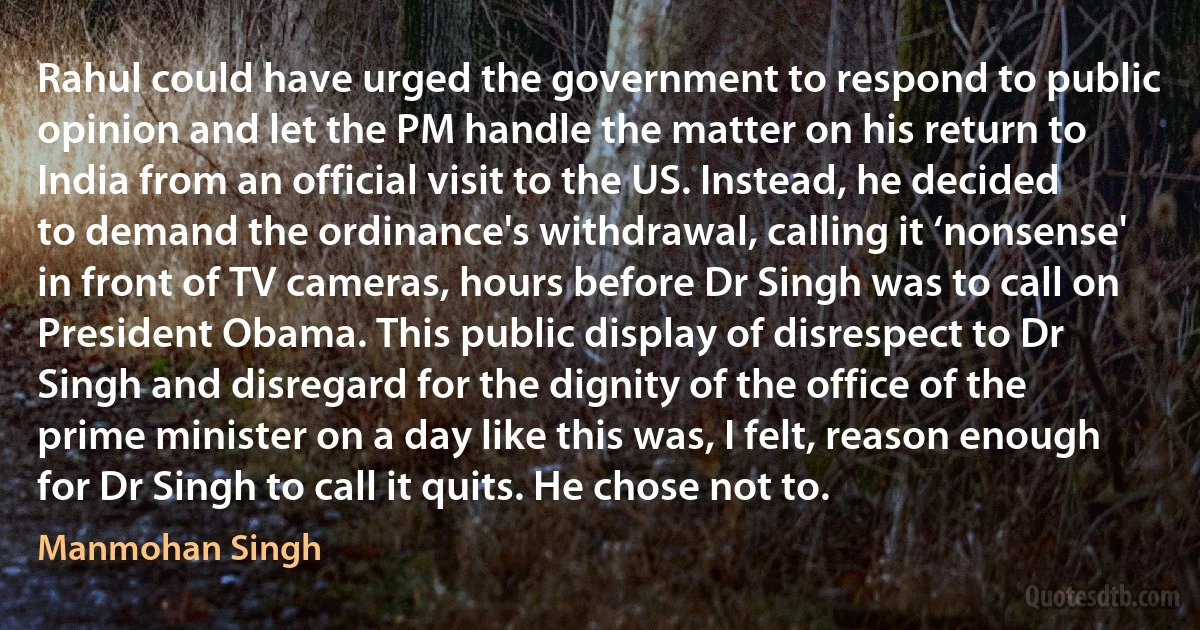Demand Quotes - page 47
Toby-Dog: It seems to me that of the two of us it's you they make the most of, and yet you do all the grumbling.
Kiki-The-Demure: A dog's logic, that! The more one gives the more I demand.
Toby-Dog: That's wrong. It's indiscreet.
Kiki-The-Demure: Not at all. I have a right to everything.
Toby-Dog: To everything? And I?
Kiki-The-Demure: I don't imagine you lack anything, do you?
Toby-Dog: Ah, I don't know. Sometimes in my very happiest moments, I feel like crying. My eyes grow dim, my heart seems to choke me. I would like to be sure, in such times of anguish, that everybody loves me; that there is nowhere in the world a sad dog behind a closed door, that no evil will ever come...
Kiki-The-Demure: And then what dreadful thing happens?
Toby-Dog: You know very well! Inevitably, at that moment She appears, carrying a bottle with horrible yellow stuff floating in it - Castor Oil!

Colette
... but I am under no apprehension of a capital injury from any other source than that of the continual depreciation of our Money.
This indeed is truly alarming, and of so serious a nature that every other effort is in vain unless something can be done to restore its credit.
..
Where this has been the policy (in Connecticut for instance) the prices of every article have fallen and the money consequently is in demand; but in the other States you can scarce get a single thing for it, and yet it is with-held from the public by speculators, while every thing that can be useful to the public is engrossed by this tribe of black gentry, who work more effectually against us that the enemys Arms; and are a hundd. times more dangerous to our liberties and the great cause we are engaged in.

George Washington
The only Real Knowledge is the Knowledge that God is the inner dweller in good people and in so-called bad, in saint and in so-called sinner. This Knowledge requires you to help all equally as circumstances demand without expectation of reward, and when compelled to take part in a dispute, to act without the slightest trace of enmity or hatred; to try to make others happy with brotherly or sisterly feeling for each one; and to harm no one in thought, word or deed, not even those who harm you.

Meher Baba
Actually, the labor market was allowed to retain its main function only on condition that wages and conditions of work, standards and regulations should be such as would safeguard the human character of the alleged commodity, labor. To argue that social legislation, factory laws, unemployment insurance, and, above all, trade unions have not interfered with the mobility of labor and the flexibility of wages, as is sometimes done, is to imply that those institutions have entirely failed in their purpose, which was exactly that of interfering with the laws of supply and demand in respect to human labor, and removing it from the orbit of the market.

Karl Polanyi
It was characteristic of the economic system of the nineteenth century that it was institutionally distinct from the rest of society. In a market economy, the production and distribution of material goods is carried on through a self-regulating system of markets, governed by laws of its own, the so-called laws of supply and demand, motivated in the last resort by two simple incentives, fear of hunger and hope of gain. This institutional arrangement is thus separate from the noneconomic institutions of society: its kinship organization and its political and religious systems. Neither the blood tie, nor legal compulsion, nor religious obligation, nor fealty, nor magic created the sociologically defined situations that insured the participation of individuals in the system. They were, rather, the creation of institutions like private property in the means of production and the wage system operating on purely economic incentives.

Karl Polanyi
Wages, profits, prices are determined, always have been determined, and always will be determined until we go Communist, by the market-by supply and demand working through the market. While we tie ourselves into knots trying to invent non-market criteria for our commissions to use, the market is there, noiselessly, efficiently, irresistibly doing the job for us all the time. Irresistibly-yes, and there's the rub. For there is one thing outside the market in a modern economy, and that is money itself. Governments can and do satisfy the demand for money, raise and lower the supply of money. In short, governments have the power to control money, which is so largely their own creation. If governments allow monetary demand to increase faster than productivity, the market will not stop the process, because it cannot stop it. The market will simply go on determining wages, profits and prices in ever higher monetary terms-until something busts.

Enoch Powell
Contrary to popular belief there is no reason whatever to suppose that the remuneration of labour in general has been raised by the combination of labour through the trade unions to a higher level than it would have stood at otherwise. The rising standard of living of the employed population is due to many causes; but restrictive practices are not among them. No doubt in individual occupations combination has from time to time succeeded in raising real wages above what they would have been in its absence; but any such gain, which is invariably at the expense of workers in other employments and of the general public, is always temporary and usually brief. After more or less inconvenience and, in recent times, by dint of more or less inflation, the pattern of real wages reverts to one which corresponds with the balance of supply and demand for labour in the various employments in different parts of the country.

Enoch Powell
Enoch was right. He had made the two intellectual leaps in economic policy which Keith Joseph and I would only make some years later. First, he had grasped that it was not the unions which caused inflation by pushing up wages, but rather the Government which did so by increasing the supply of money in the economy. Consequently, incomes policies...were a supreme irrelevance to anti-inflation policy. The only aspect of the matter which Enoch then and later failed sufficiently to grasp was the importance of the indirect link between trade union power and inflation. This lay in the fact that over-powerful trade unions priced their own members out of jobs, and inflicted unemployment on both union and non-union workers alike. Governments...would then react by lowering interest rates and expanding the money supply. This would increase demand and jobs for a time, but it also increased inflation... That said, Enoch's insight into the cause of inflation was of supreme importance.

Enoch Powell
The British, French, and Russian Governments mutually engage not to conclude peace separately during the present war. The three Governments agree that when terms of peace come to be discussed no one of the Allies will demand terms of peace without the previous agreement of each of the other Allies.

Edward Grey, 1st Viscount Grey of Fallodon
We stand today, docile and defenseless, because, since 1868, our political and economic power has been systematically stripped away by the United States for its own political and economic gain. We stand as a nation forced not only to demand our liberty, but to demand reparations for having our political and economic liberty taken away. We stand as a nation surrounded by industry, but with little of it belonging to our people. The business development in Puerto Rico since the United States intervention should have made the island one of the most prosperous islands in the world, but that is not the case.

Pedro Albizu Campos
Let us be understood. If the Japanese surrender after the destruction of Hiroshima, having been intimidated, we will rejoice. But we refuse to see anything in such grave news other than the need to argue more energetically in favor of a true international society, in which the great powers will not have superior rights over small and middle-sized nations, where such an ultimate weapon will be controlled by human intelligence rather than by the appetites and doctrines of various states.
Before the terrifying prospects now available to humanity, we see even more clearly that peace is the only goal worth struggling for. This is no longer a prayer but a demand to be made by all peoples to their governments - a demand to choose definitively between hell and reason.

Albert Camus
All Property indeed, except the Savage's temporary Cabin, his Bow, his Matchcoat, and other little Acquisitions absolutely necessary for his Subsistence, seems to me to be the Creature of publick Convention. Hence the Public has the Right of Regulating Descents & all other Conveyances of Property, and even of limiting the Quantity & the Uses of it. All the Property that is necessary to a Man for the Conservation of the Individual & the Propagation of the Species, is his natural Right which none can justly deprive him of: But all Property of the Publick, who by their Laws have created it, and who may therefore by other Laws dispose of it, whenever the Welfare of the Publick shall demand such Disposition. He that does not like civil Society on these Terms, let him retire & live among Savages. - He can have no right to the Benefits of Society who will not pay his Club towards the Support of it.

Benjamin Franklin
The laws of supply and demand, therefore, are adjuncts to immigration regulation. I do not fear the arrival of as many immigrants a year as shipping conditions or passport requirements can handle, provided they are of good character. But there is no room for the alien who turns toward America with the avowed intention of opposing government, with a set desire to teach destruction of government- which means not only enmity toward organized society, but toward every form of religion and so basic an institution as the home.

Calvin Coolidge
If you choose to deal with men by means of compulsion, do so. But you will discover that you need the voluntary co-operation of your victims, in many more ways than you can see at present. And your victims should discover that it is their own volition-which you cannot force-that makes you possible. I choose to be consistent and I will obey you in the manner you demand. Whatever you wish me to do, I will do it at the point of a gun. If you sentence me to jail, you will have to send armed men to carry me there-I will not volunteer to move. If you fine me, you will have to seize my property to collect the fine-I will not volunteer to pay it. If you believe that you have the right to force me-use your guns openly. I will not help you to disguise the nature of your action.

John Galt
His countrymen owe him gratitude as the pioneer of our system of national parks. ... Out of the fight which he led for the better care of the Yosemite by the State of California grew the demand for the extension of the system. To this many persons and organizations contributed, but Muir's writings and enthusiasm were the chief forces that inspired the movement. All the other torches were lighted from his.

John Muir
The old murals came from the heart,” Zima said. "I painted on a huge scale because that was what the subject matter seemed to demand.”
"It was good work,” I said.
"It was hack work. Huge, loud, demanding, popular, but ultimately soulless. Just because it came from the heart didn't make it good.

Alastair Reynolds
The eight hour work day is one of the most justified demands of the workers... Nobody who feels even just a trace of social feeling within himself will be able to stand aloof from the moral as well as the social-political justification for this demand. Well, work, as is known, is not an end in itself, rather only a means to an end.

Joseph Goebbels
Whether you are interested in moksha, liberation, freedom, transformation, you name it, you are interested in happiness without one moment of unhappiness, pleasure without pain, it is the same thing. Whether one is here in India or Russia or in America or anywhere, what people want is to have one without the other. But there is no way you can have one without the other. This demand is not in the interest of the survival of this living organism.

U. G. Krishnamurti
Inside these modern National frontiers, the workers have been working harder and getting little more than their ancestors did in the feudal system. So the so-called revolutionists attack their Governments and ruling classes, accusing them of not controlling the social system as it should be controlled. Socialist, Social-Democrat, Communist, Fascist, National Socialist (Nazi) all demand that Government make a better social system; that Government control the men who produce and distribute goods; that Government create security for men on this earth. The basis of all this thinking is ignorance of creative energy; it is ignorance of the real nature of human beings; it is the ancient, pagan superstition that Authority controls a static, limited universe.

Rose Wilder Lane
The historic meaning of the words "high crimes and misdemeanors,” the writings of the Founders and my own reasoned judgment convince me that a president can indeed commit acts against the public trust that are so egregious that while they are not statutory crimes, they would demand removal from office. To maintain that the lack of a codified and comprehensive list of all the outrageous acts that a president might conceivably commit renders Congress powerless to remove such a president defies reason.

Mitt Romney



